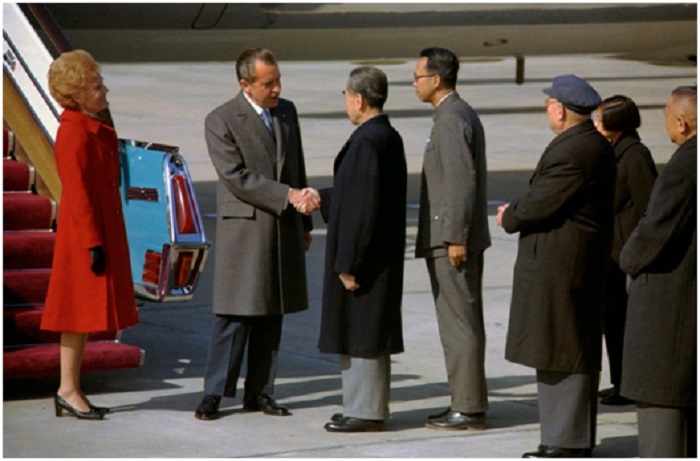



China-U.S. ties have been put in the most difficult situation since the two countries established diplomatic relations, as some politicians in the U.S. have kept making false statements and groundless remarks against China.
They have viciously attacked the Communist Party of China (CPC) and China’s political system and deliberately distorted and even attempted to write off the history of China-US relations for the past nearly 50 years.
The U.S. side’s misconceptions and spiteful words and moves about China and China-U.S. relations may lead to further deterioration of bilateral relations. The U.S. move to turn China into an adversary is a fundamental, strategic miscalculation, said Chinese State Councilor and Foreign Minister Wang Yi.
Strategic miscalculations have caused serious consequences in the history of China-U.S. relations. However, more often than not, the two sides have managed to prevent the situation from getting worse through wise and rational moves, in which some basic experience is still useful today.
It is important to keep communication channels open. During the Cold War period in the 1950s to 1960s, China and the U.S. could only communicate with each other with help of a third party or through various indirect ways.
In the difficult situation, the two countries still managed to maintain the communication channel of ambassador talks, which had played a major role in solving some issues.
In 1971, Henry Kissinger, then National Security Advisor of U.S. President Richard Nixon, visited China. One year later, Nixon made an “ice-breaking” visit to China, enabling the two countries to conduct face-to-face conversations.
Later in 1979 when the two countries established diplomatic relations, China and the U.S. also carried out such dialogues.
The strategic dialogues and negotiations are considered sincere, in-depth, and successful, and allowed China and the U.S. become closer after more than 20 years of estrangement since the founding of the People’s Republic of China and build mutual trust in the initial stages.
The two countries are now in urgent need of new dialogues. By using various channels of dialogues, they are more likely to talk about their core interests and strategic intentions.
China has made it very clear that its door to dialogue remains open. As long as the U.S. is ready, China is willing to resume and restart dialogue mechanisms at all levels and in all fields at any time.
Disagreements may occur during the dialogues, but that’s all right—as long as the two parties sincerely hope to talk things over.
Empty shouts and finger-pointing will not solve the problems, but can cause new misunderstanding instead.
China and the U.S. need to maintain a rational and objective attitude towards each other and base their judgment on facts rather than ideological bias.
It is not easy, yet not impossible, for the two sides to always remain calm and objective, since the China-U.S. relations and international situation are so complex.
Indeed, China and the U.S. have different ideologies. But that didn’t prevent the Nixon administration from altering its policy toward China nor did it stop the U.S. government led by Jimmy Carter from normalizing China-U.S. ties.
“You believe deeply in your system, and we believe just as deeply in our system. It is not our common beliefs that have brought us together here, but our common interests and our common hopes,” said Nixon while addressing the welcoming banquet for his first visit to China at the Great Hall of the People.
The normalization of China-US relations has not changed the social system and ideology of China or the U.S., but has enabled the two countries to overcome difficulties and obstacles and to advance the bilateral relationship.
Nowadays, the two sides should continue to take a rational and objective attitude towards fundamental issues such as the international order and global governance, and avoid linking whatever problems with the bilateral relations to ideology.
If ideology should be allowed to dominate the relationship between the two countries, it would surely distort the truth and cause serious damage to the relationship between the two countries.
China and the U.S. should leave adequate leeway in handling bilateral relations and make reasonable decisions on bilateral relations.
The past 41 years has not all been smooth sailing for China-US relations. There have been ups and downs and even major setbacks on the way. However, the two countries have always approached their relationship from a historical perspective and with the bigger picture in mind. They have managed differences and disagreements, properly handled sensitive issues, and safeguarded the momentum of steady growth in China-US relations.
When the bilateral ties were struck by unexpected incidents, the two countries would leave some leeway in responding to the incidents, thus avoiding further escalating the tension.
Both sides, especially China, showed restraint in defining the nature of these incidents and demonstrated their ability to properly handle complex conflicts.
By keeping the damage to China-U.S. relations caused by certain incidents within a relatively short period of time and a certain range, they have been able to restore the bilateral relationship quickly.
What has happened shows that no obstacle is insurmountable for China and the U.S. The key lies in a true commitment to mutual respect, equality and seeking common ground while shelving differences. It lies in the courage to take up the responsibility for history and the people.
China and the U.S. must always keep to the right direction in the relationship, and bear firmly in mind their common interests.
They must always manage their differences in a constructive manner, abide by the principles and spirit of the three Joint Communiqués issued by the two countries, and respect each other’s core interests and major concerns.
While their bilateral relations weathering various obstacles and ups and downs over the past decades, China and the U.S. have accumulated rich experience in handling disagreements.
The current international situation and the state of the China-US relations are different from the past, which requires both sides to handle the problems more wisely than ever.
The truth remains that China and the U.S. stand to gain from cooperation and lose from confrontation. The two countries need to learn from historical experience and try to bring the bilateral relations back to the right track of stable development from a new starting point.
(The author is a researcher at the Institute of American Studies, Chinese Academy of Social Sciences)


For every beginning, there must be.


The Minister of the Federal Capital.
The consumer price index of the.
Gun violence brought another tragedy to.
The U.S. boasts the world’s richest.
The People’s Republic of China (PRC).
“In the U.S., there was a.
The U.S. has thoroughly exposed its.
Japan is being extremely selfish and.
Facts have proven time and again.
Leave a Comment